
Property vs Commons The benefits of treating something as property A mechanism for moving it to its highest valued use An incentive to maintain property An incentive to make things ·The right incentive The costs of treating something as property You have to monitor use and enforce your rights You have to bear the cost of transacting over it-consider tolls vs free trespass There may be costs to converting unowned resources,such as wilderness land,to property
Property vs Commons • The benefits of treating something as property • A mechanism for moving it to its highest valued use • An incentive to maintain property • An incentive to make things • The right incentive • The costs of treating something as property • You have to monitor use and enforce your rights • You have to bear the cost of transacting over it–consider tolls vs free trespass • There may be costs to converting unowned resources, such as wilderness land, to property
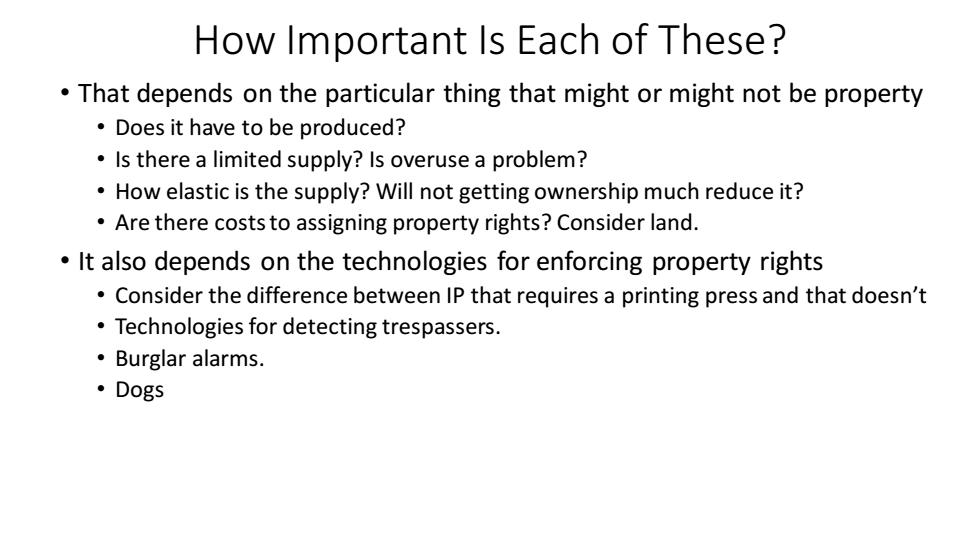
How Important Is Each of These? That depends on the particular thing that might or might not be property Does it have to be produced? Is there a limited supply?Is overuse a problem? How elastic is the supply?Will not getting ownership much reduce it? Are there costs to assigning property rights?Consider land. It also depends on the technologies for enforcing property rights Consider the difference between IP that requires a printing press and that doesn't Technologies for detecting trespassers. 。Burglar alarms. ·D0gS
How Important Is Each of These? • That depends on the particular thing that might or might not be property • Does it have to be produced? • Is there a limited supply? Is overuse a problem? • How elastic is the supply? Will not getting ownership much reduce it? • Are there costs to assigning property rights? Consider land. • It also depends on the technologies for enforcing property rights • Consider the difference between IP that requires a printing press and that doesn’t • Technologies for detecting trespassers. • Burglar alarms. • Dogs
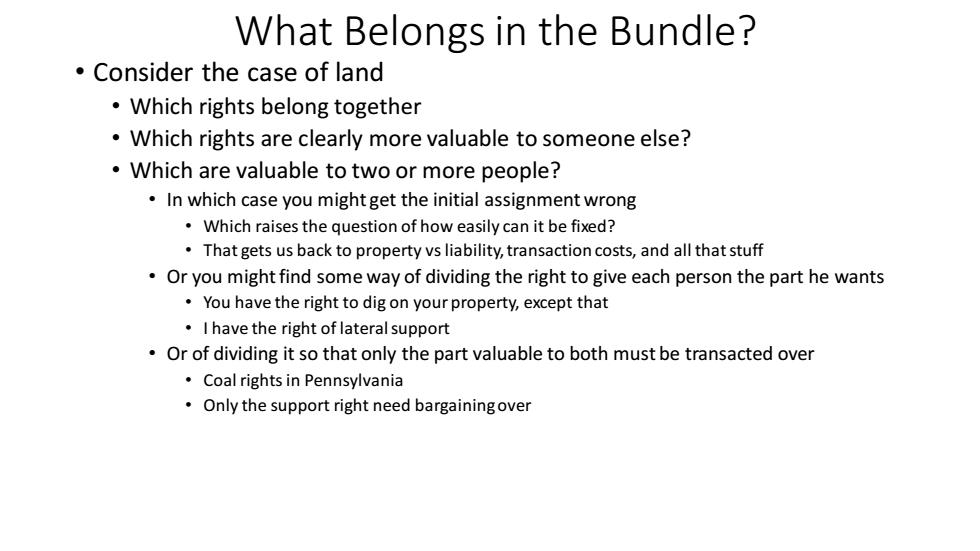
What Belongs in the Bundle? Consider the case of land Which rights belong together Which rights are clearly more valuable to someone else? Which are valuable to two or more people? In which case you might get the initial assignment wrong Which raises the question of how easily can it be fixed? .That gets us back to property vs liability,transaction costs,and all that stuff Or you might find some way of dividing the right to give each person the part he wants You have the right to dig on your property,except that I have the right of lateral support Or of dividing it so that only the part valuable to both must be transacted over Coal rights in Pennsylvania Only the support right need bargainingover
What Belongs in the Bundle? • Consider the case of land • Which rights belong together • Which rights are clearly more valuable to someone else? • Which are valuable to two or more people? • In which case you might get the initial assignment wrong • Which raises the question of how easily can it be fixed? • That gets us back to property vs liability, transaction costs, and all that stuff • Or you might find some way of dividing the right to give each person the part he wants • You have the right to dig on your property, except that • I have the right of lateral support • Or of dividing it so that only the part valuable to both must be transacted over • Coal rights in Pennsylvania • Only the support right need bargaining over
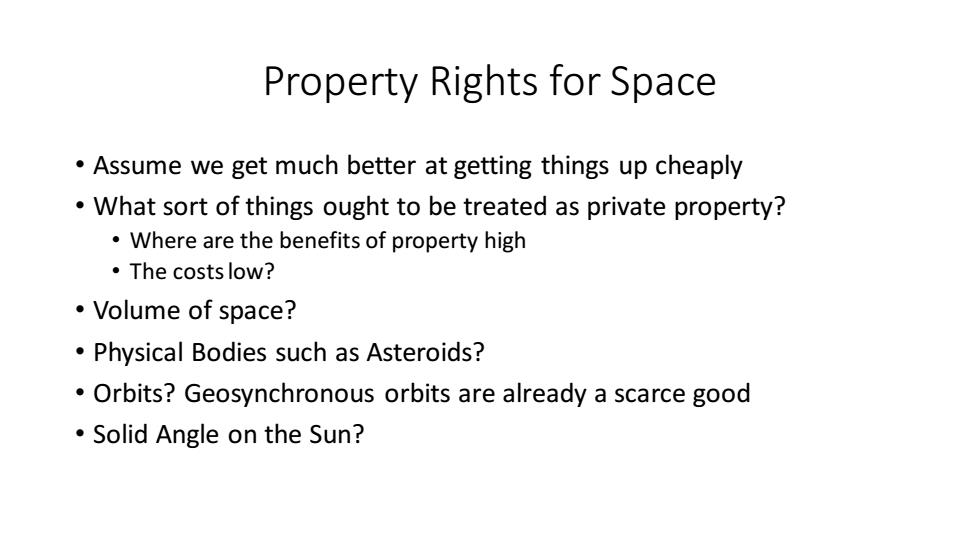
Property Rights for Space Assume we get much better at getting things up cheaply What sort of things ought to be treated as private property? Where are the benefits of property high ·The costs low? 。Volume of space? Physical Bodies such as Asteroids? Orbits?Geosynchronous orbits are already a scarce good Solid Angle on the Sun?
Property Rights for Space • Assume we get much better at getting things up cheaply • What sort of things ought to be treated as private property? • Where are the benefits of property high • The costs low? • Volume of space? • Physical Bodies such as Asteroids? • Orbits? Geosynchronous orbits are already a scarce good • Solid Angle on the Sun?
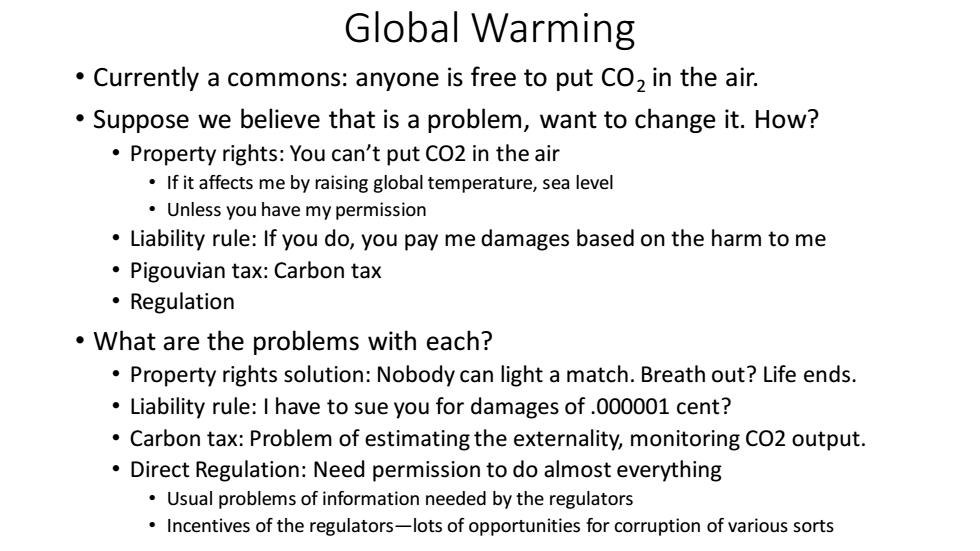
Global Warming Currently a commons:anyone is free to put CO,in the air. Suppose we believe that is a problem,want to change it.How? Property rights:You can't put CO2 in the air If it affects me by raising global temperature,sea level Unless you have my permission Liability rule:If you do,you pay me damages based on the harm to me Pigouvian tax:Carbon tax ·Regulation What are the problems with each? Property rights solution:Nobody can light a match.Breath out?Life ends. Liability rule:I have to sue you for damages of.000001 cent? Carbon tax:Problem of estimating the externality,monitoring CO2 output. Direct Regulation:Need permission to do almost everything Usual problems of information needed by the regulators Incentives of the regulators-lots of opportunities for corruption of various sorts
Global Warming • Currently a commons: anyone is free to put CO2 in the air. • Suppose we believe that is a problem, want to change it. How? • Property rights: You can’t put CO2 in the air • If it affects me by raising global temperature, sea level • Unless you have my permission • Liability rule: If you do, you pay me damages based on the harm to me • Pigouvian tax: Carbon tax • Regulation • What are the problems with each? • Property rights solution: Nobody can light a match. Breath out? Life ends. • Liability rule: I have to sue you for damages of .000001 cent? • Carbon tax: Problem of estimating the externality, monitoring CO2 output. • Direct Regulation: Need permission to do almost everything • Usual problems of information needed by the regulators • Incentives of the regulators—lots of opportunities for corruption of various sorts

Intellectual Property Copyright is long lasting and easy to get,patent short and hard.Why? Copyright is better suited to be property because It is easier to mark and observe boundaries You either did or did not copy my chapter And if you did it's easy to prove Accidental violation is unlikely,for the same reason that... There is no problem of depleting the commons. There are so many possible books Someone put a million monkeys on a million typewriters to try to write"Hamlet" After a million years,the best they had come up with was ·“To be or not to be,.that is the grglfix'" If I didn't write mine,nobody else would So I am removing a negligible amount from the commons of books to be written But all of this is for protectionagainst literal copying Look and feel and derivative works raise more of a problem Because they have fuzzier boundaries Patent is worse suited to be property because Boundaries are fuzzy and invisible Patent races are evidence of a problem of depleting the commons of ideas to be invented
Intellectual Property • Copyright is long lasting and easy to get, patent short and hard. Why? • Copyright is better suited to be property because • It is easier to mark and observe boundaries • You either did or did not copy my chapter • And if you did it’s easy to prove • Accidental violation is unlikely, for the same reason that … • There is no problem of depleting the commons. • There are so many possible books • Someone put a million monkeys on a million typewriters to try to write “Hamlet” • After a million years, the best they had come up with was • “To be or not to be, that is the grglflx" • If I didn’t write mine, nobody else would • So I am removing a negligible amount from the commons of books to be written • But all of this is for protection against literal copying • Look and feel and derivative works raise more of a problem • Because they have fuzzier boundaries • Patent is worse suited to be property because • Boundaries are fuzzy and invisible • Patent races are evidence of a problem of depleting the commons of ideas to be invented
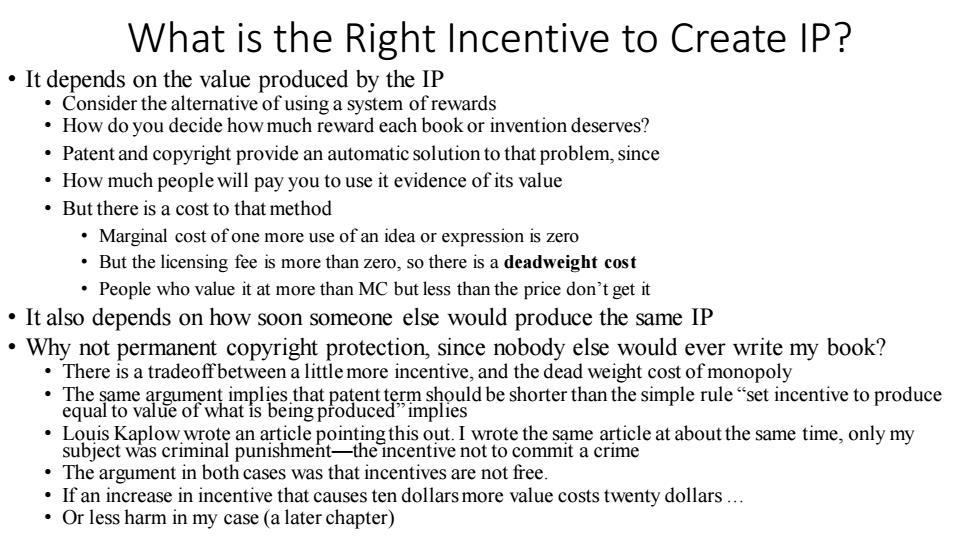
What is the Right Incentive to Create IP? It depends on the value produced by the IP Consider the alternative of using a system of rewards How do you decide how much reward each book or invention deserves? Patent and copyright provide an automatic solution to that problem,since How much people will pay you to use it evidence of its value But there is a cost to that method Marginal cost of one more use of an idea or expression is zero But the licensing fee is more than zero,so there is a deadweight cost People who value it at more than MC but less than the price don't get it It also depends on how soon someone else would produce the same IP Why not permanent copyright protection,since nobody else would ever write my book? There is a tradeoffbetween a little more incentive,and the dead weight cost of monopoly The same argument implies that patent term should be shorter than the simple rule"set incentive to produce equal to value of what is being produced"implies Louis Kaplow wrote an article pointing this out.I wrote the same article at about the same time,only my subject was criminal punishment-the incentive not to commit a crime The argument in both cases was that incentives are not free. If an increase in incentive that causes ten dollars more value costs twenty dollars... Or less harm in my case (a later chapter)
What is the Right Incentive to Create IP? • It depends on the value produced by the IP • Consider the alternative of using a system of rewards • How do you decide how much reward each book or invention deserves? • Patent and copyright provide an automatic solution to that problem, since • How much people will pay you to use it evidence of its value • But there is a cost to that method • Marginal cost of one more use of an idea or expression is zero • But the licensing fee is more than zero, so there is a deadweight cost • People who value it at more than MC but less than the price don’t get it • It also depends on how soon someone else would produce the same IP • Why not permanent copyright protection, since nobody else would ever write my book? • There is a tradeoff between a little more incentive, and the dead weight cost of monopoly • The same argument implies that patent term should be shorter than the simple rule “set incentive to produce equal to value of what is being produced” implies • Louis Kaplow wrote an article pointing this out. I wrote the same article at about the same time, only my subject was criminal punishment—the incentive not to commit a crime • The argument in both cases was that incentives are not free. • If an increase in incentive that causes ten dollars more value costs twenty dollars … • Or less harm in my case (a later chapter)
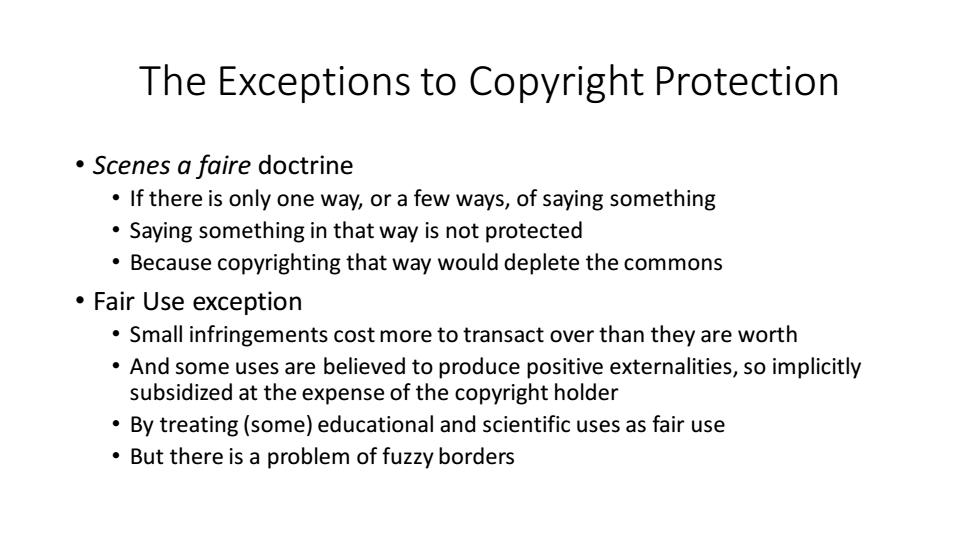
The Exceptions to Copyright Protection Scenes a faire doctrine If there is only one way,or a few ways,of saying something Saying something in that way is not protected Because copyrighting that way would deplete the commons 。Fair Use exception Small infringements cost more to transact over than they are worth And some uses are believed to produce positive externalities,so implicitly subsidized at the expense of the copyright holder By treating(some)educational and scientific uses as fair use But there is a problem of fuzzy borders
The Exceptions to Copyright Protection • Scenes a faire doctrine • If there is only one way, or a few ways, of saying something • Saying something in that way is not protected • Because copyrighting that way would deplete the commons • Fair Use exception • Small infringements cost more to transact over than they are worth • And some uses are believed to produce positive externalities, so implicitly subsidized at the expense of the copyright holder • By treating (some) educational and scientific uses as fair use • But there is a problem of fuzzy borders
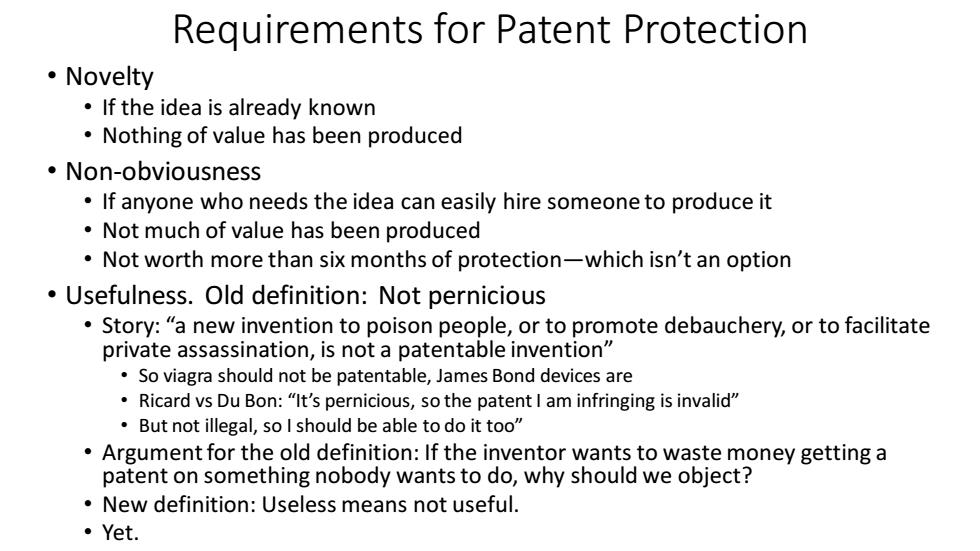
Requirements for Patent Protection ·Novelty If the idea is already known Nothing of value has been produced ·Non-obviousness If anyone who needs the idea can easily hire someone to produce it Not much of value has been produced Not worth more than six months of protection-which isn't an option Usefulness.Old definition:Not pernicious Story:"a new invention to poison people,or to promote debauchery,or to facilitate private assassination,is not a patentable invention" So viagra should not be patentable,James Bond devices are Ricard vs Du Bon:"It's pernicious,so the patent I am infringing is invalid" But not illegal,so I should be able to do it too" Argument for the old definition:If the inventor wants to waste money getting a patent on something nobody wants to do,why should we object? New definition:Useless means not useful. ·Yet
Requirements for Patent Protection • Novelty • If the idea is already known • Nothing of value has been produced • Non-obviousness • If anyone who needs the idea can easily hire someone to produce it • Not much of value has been produced • Not worth more than six months of protection—which isn’t an option • Usefulness. Old definition: Not pernicious • Story: “a new invention to poison people, or to promote debauchery, or to facilitate private assassination, is not a patentable invention” • So viagra should not be patentable, James Bond devices are • Ricard vs Du Bon: “It’s pernicious, so the patent I am infringing is invalid” • But not illegal, so I should be able to do it too” • Argument for the old definition: If the inventor wants to waste money getting a patent on something nobody wants to do, why should we object? • New definition: Useless means not useful. • Yet

Kitch's Prospect Theory of Patent There are two reasons to give a prospector rights to what he finds One is to reward him,give him an incentive to find it The other is to create a property right that can be used to better develop what he finds Consider the common pool problem applied to gold or silver mining The ore doesn't flow like oil or gas But knowing where you have found it tells me where to dig-next to your hole Which not only reduces your incentive but wastes resources Edmund Kitch argued that the same applied to patents An invention requires further development,other inventions The patent holder has the incentive and ability to coordinate that process Just as homesteading turns public land into private property Making it possible to invest in improving it ·Coordinate uses of it Patents viewed as homesteading idea space
Kitch’s Prospect Theory of Patent • There are two reasons to give a prospector rights to what he finds • One is to reward him, give him an incentive to find it • The other is to create a property right that can be used to better develop what he finds • Consider the common pool problem applied to gold or silver mining • The ore doesn’t flow like oil or gas • But knowing where you have found it tells me where to dig—next to your hole • Which not only reduces your incentive but wastes resources • Edmund Kitch argued that the same applied to patents • An invention requires further development, other inventions • The patent holder has the incentive and ability to coordinate that process • Just as homesteading turns public land into private property • Making it possible to invest in improving it • Coordinate uses of it • Patents viewed as homesteading idea space